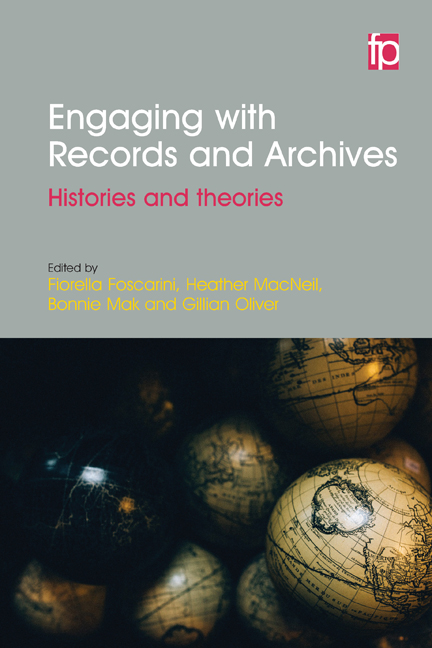Book contents
- Frontmatter
- Frontmatter
- Editors and contributors
- Editors’ introduction
- PART 1 RETHINKING HISTORIES AND THEORIES
- PART 2 ENGAGING RECORDS AND ARCHIVES
- 6 The use and reuse of documents by chancellors, archivists and government members in an early modern republican state: Genoa's Giunta dei confini and its archives
- 7 The bumpy road to transparency: access and secrecy in 19th-century records in the Dutch East Indies
- 8 Archival ethics and indigenous justice: conflict or coexistence?
- 9 History and development of information and recordkeeping in Malawi
- 10 History of community archiving in Poland
- 11 Reflecting on practice: artists’ experiences in the archives
- Index
8 - Archival ethics and indigenous justice: conflict or coexistence?
from PART 2 - ENGAGING RECORDS AND ARCHIVES
Published online by Cambridge University Press: 08 June 2018
- Frontmatter
- Frontmatter
- Editors and contributors
- Editors’ introduction
- PART 1 RETHINKING HISTORIES AND THEORIES
- PART 2 ENGAGING RECORDS AND ARCHIVES
- 6 The use and reuse of documents by chancellors, archivists and government members in an early modern republican state: Genoa's Giunta dei confini and its archives
- 7 The bumpy road to transparency: access and secrecy in 19th-century records in the Dutch East Indies
- 8 Archival ethics and indigenous justice: conflict or coexistence?
- 9 History and development of information and recordkeeping in Malawi
- 10 History of community archiving in Poland
- 11 Reflecting on practice: artists’ experiences in the archives
- Index
Summary
MUCH HAS BEEN made in the last two decades of the ‘decolonization’ of institutions, theories and practices in the Western world. Archives are no exception. Broadly speaking, decolonization refers to the undoing of colonialism. Within professions it can refer to the recognition of professional theories and practices as being formed by a colonial mind-set, and continuing to assert and maintain the power and interests of the dominant culture. Māori scholar Linda Tuhiwai Smith (1999, 39) notes in her seminal work, Decolonizing Methodologies: research and indigenous peoples, that decolonization ‘does not mean and has not meant a total rejection of all theory or research or Western knowledge’, but instead ‘is about centring our [Indigenous] concerns and world views and then coming to know and understand theory and research from our own perspectives and for our own purposes’. Given the preponderance of records relating to Indigenous peoples currently held in Western archives, it is necessary to consider how archives may perpetuate colonialism, as well as steps which can be taken towards decolonization.
Archivists have long taken pride in the implicit and explicit link between archives and justice, but what happens when justice and long-held archival principles are in direct conflict? Using a case study as a launching point, this chapter examines how archival theories of creation, ownership and authorship – born out of Western colonial thought and philosophy – together with archival values of access and preservation, may actually serve to undermine archivists’ efforts to pursue justice and nurture relationships with historically oppressed peoples.
It contends that the archival community would do well to consider pushing beyond its current practices and Codes of Ethics when making decisions which impact on Indigenous communities, and that true justice may actually lie in the rejection of some of its own long-held theories and practices in favour of actions which respect Indigenous ways of knowing and perspectives of recordkeeping.
We will begin by setting the stage for the case study by providing contextual information about Indigenous peoples in Canada and about Indigenous knowledge systems. This will be followed by the case study itself, which is an example of an interaction between a non-Indigenous archival institution and Indigenous community members.
- Type
- Chapter
- Information
- Engaging with Records and ArchivesHistories and Theories, pp. 147 - 172Publisher: FacetPrint publication year: 2016



